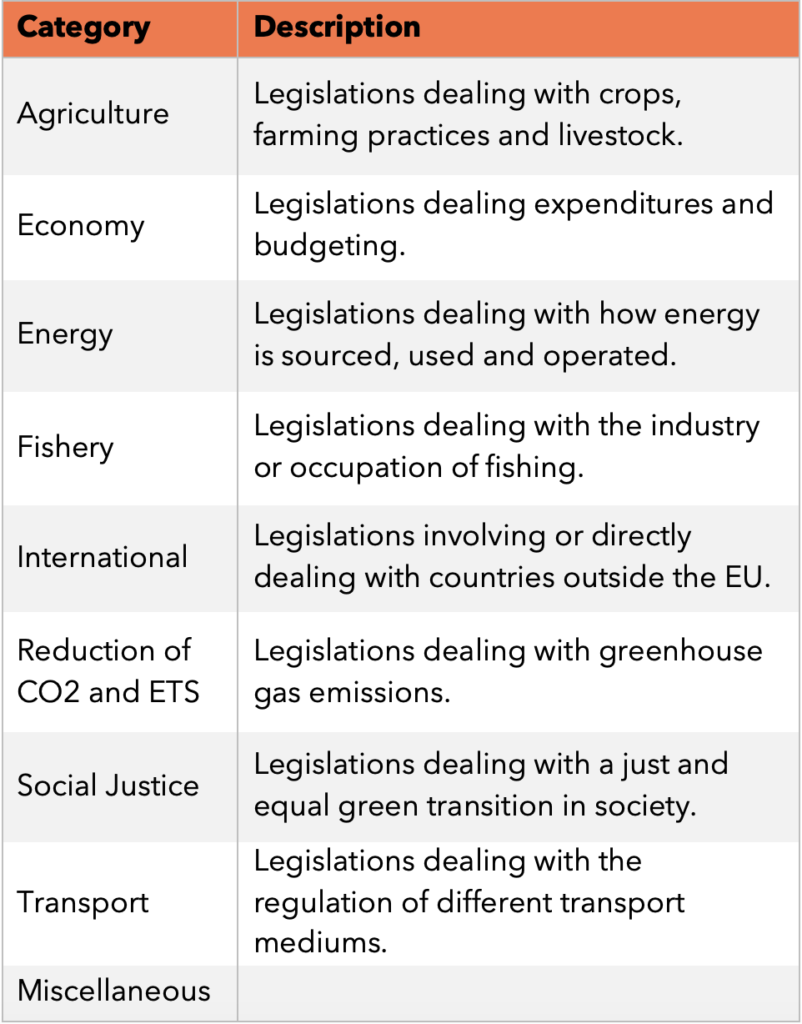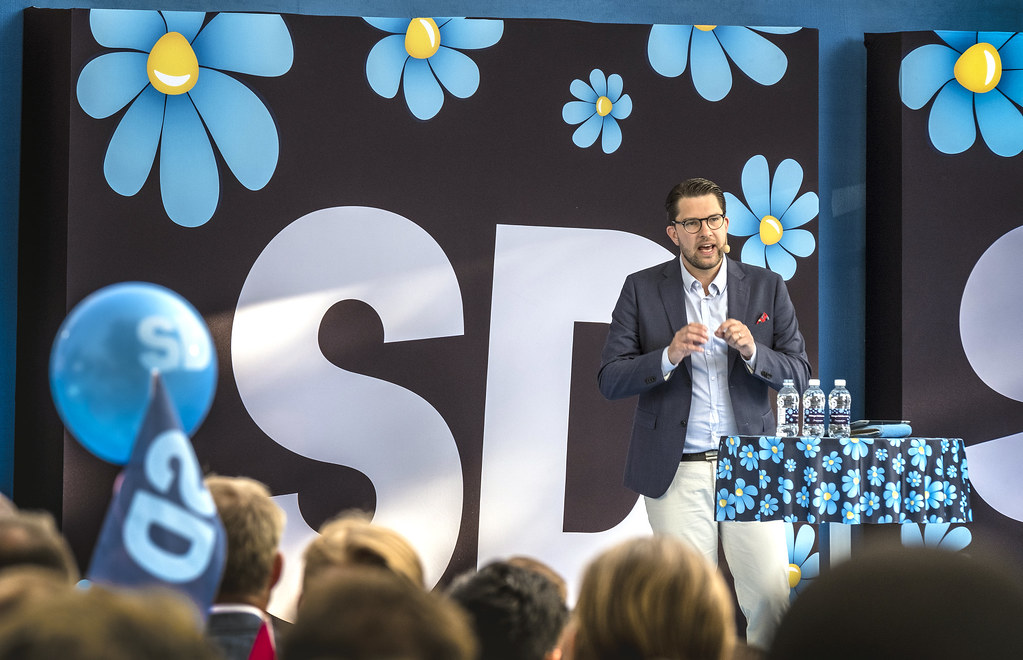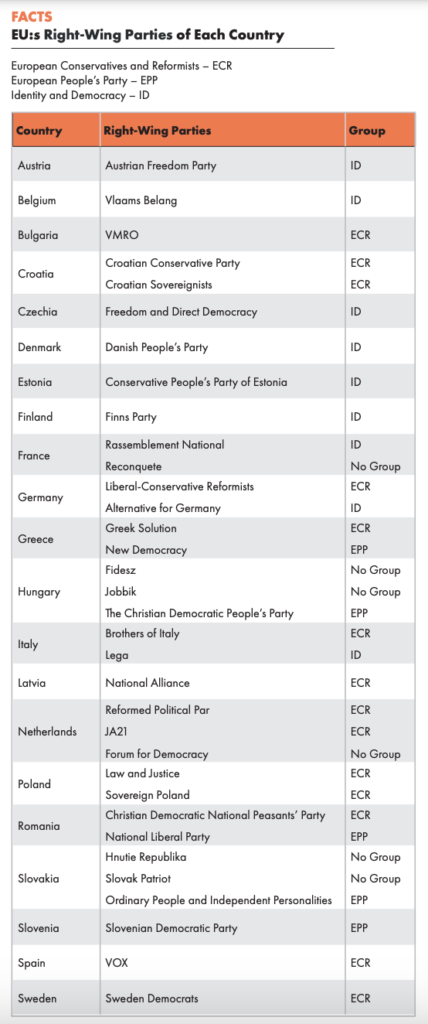By Greta Hirschberg and Anna Hallgren
Data analyst: Marine Delrue.
Sweden’s right-wing populist party Sweden Democrats, votes the most against regulations involving the Green Deal of all other right-wing and populist parties in the EU. Historically considered one of the most environmentally friendly countries in the world, this shift solidifies the grip far right ideology has on the EU.

Since 2020, the Swedish Democrats have voted the most against environmental regulations regarding or involving the Green Deal. Out of the 222 times the Sweden Democrats voted, 69,4% of them were against these green legislations.
The Green Deal is a plan proposed by the European Parliament so the EU has no net emission of greenhouse gasses by 2050 and a more circular economy. The Green Deal, which began in 2020 with a budget of 503 billion euros, will affect every corner of Europe’s economy and society. This ambitious plan was responded with enthusiasm by some and disdain from others. The party who, proportionally to their votes, presents the most resistance comes from the historically environmentally friendly and green trend setting Sweden.
“The Swedish government has started to falter concerning the climate goals and it is the Sweden Democrats that are pushing for that in the background. Sweden is about to embarrass itself”, says Roger Hildingsson, a Swedish political scientist.
According to the European Center for Populism Studies right wing populism can be defined as the following:
“[It’s] a political ideology which combines right-wing politics and populist rhetoric and themes. The rhetoric often consists of anti-elitist sentiments, opposition to the perceived ‘establishment’, and speaking to the ‘common people’“
Similarly, far right ideologies include “extreme nationalism, nativist ideologies, and authoritarian tendencies”. Far right and populist right parties often overlap.
All the parties are either independent or belong to one of these three European Parliament groups: European Conservative and reformers (ECR), Identity and Democracy (ID) or the European People’s Party (PPE/EPP). The populist right-wing parties that follow Sweden as voting the most against environmental regulations since 2020 belong to the Czech Republic, Finland and Germany with 61,2%, 60,4% and 60% of their votes, respectively. Greece, Romania and Slovenia have the right-wing parties that vote the least against green regulations at 8,2%, 7,6% and 6,8%, respectively.
The party’s votes can also be separated into unofficial categories within the Green Deal. They were crafted according to what the legislation was about and the issues they tackled. The categories are the following: Agriculture, Economy, Energy, Fishery, International, Reduction of Co2 and ETS, Social Justice, Transport and Miscellaneous. See how each countries right-wing party voted within the different categories below.

In votes concerning the category social justice related to the Green Deal, the Sweden Democrats voted 100% against. Examples of regulations tackling this issue are support to victims of environmental disasters and measures to strengthen human rights in relation to climate change. They also voted against the only international measures concerning the Green Deal that is about supporting sustainable and inclusive development in Africa.

According to Hildingsson, the voting in these categories is not surprising. “There they follow an old line of resistance to the EU. This thing about not transferring decision-making power with Brussels at all”.
Sweden has long been held as an example of progressive and environmental politics both in the EU and in the world, Hildingsson says. However, he is worried that Sweden now is becoming an example of how a country lost its path and fell into the right-wing rabbit hole.To understand how this fall from grace occurred, we first need to understand who the Swedish Democrats are, the leaders of this political, economical and societal change.
Who are the Swedish Democrats?
The Swedish Democrats are on a mission to make Sweden great again, as stated in their website. According to their definition, their party is a social conservative party with a nationalistic foundation, but social scientists define them as right wing populists.

The group was founded in 1988 with ties to the Neo-Nazi group Keep Sweden Swedish. It wasn’t until 30 years later that the group started being recognized as a political force not to be reckoned with. This last decade the Sweden Democrats´ popularity rose to the point of now being the fastest growing party in Sweden and the second biggest after the 2022 election.
The cause of this rapid increase in popularity has been mainly attributed to the large wave of immigrants that entered the country in mid 2010’s which many citizens thought their inclusion into society was handled badly by the government. Furthermore, Sweden has seen a steady rise of gun and gang related violence. These events led to a general distrust of societal institutions and a conservative mindset that craves to live like they lived in the past, when “Sweden was great”. In short, the past decade proved to be a tipping point for Sweden’s society. Faced by these new challenges and circumstances, The Sweden Democrats became the saving grace of millions that felt ignored by the state and uncertain of the rapidly changing Swedish society.
Since then, members of the Sweden Democrats have been a large subject of debate in Sweden. They have made a line of statements and actions that have been considered racist. Furthermore, already in 2018, the Sweden Democrats were on top of the list in terms of the percentage of crime accused candidates. Peter Lundgren for example, one of their parlamentaries in the EU, was convicted of sexual assault in 2021. Because of this he left the party but still votes as an independent in the European Parliament. The last couple of months, the Sweden Democrats have made many statements concerning the climate that many have deemed controversial and dangerous. One of their members, Elsa Widding, recently stated that the climate crisis lacks scientific support. She is no longer a party member but votes independently in the Swedish parliament. Hildingsson tells us that another typical argument they use is that Sweden is a small country and only accounts for a small number of the world’s greenhouse emissions, so other countries should do their part instead. This stance is commonly seen in other right-wing parties as well.
“A reason for this is that if you want to oppose the work of saving the climate, you will use the strategies that fit into that context. In some cases it is about saying that climate change is not happening and in some cases it is about saying that it is happening or that Sweden is too small or that the EU's policy goes too far. And with the Sweden Democrats, you can see this mixed rhetoric that is adapted to the audience” Kjell Wolves says, a doctoral student specializing in climate change in Chalmers University.

The Rise of the European Far Right
Matthew Lockwood, a senior lecturer at the University of Sussex specializing in the politics of climate policy, says that when trying to describe the rise of the far right in Europe it’s important to understand the concept of populism.
“I would say it is an ideology in which the basic division in society and politics is between ‘pure people’ and a ‘corrupt elite’, and where there is a belief that politics should be an expression of the will of the people”
He explains that during the past two decades there has been a global change in labor thanks to globalization and new technology. This led to a decline in traditional semi-skilled and unskilled jobs that left workers feeling unrepresented by social democratic parties that started to turn to university graduate voters. Moreover, new social movements, immigration and more changed the socio economic and political landscape of Europe leaving these workers feeling distressed and ignored. “Populism is a reactive ideology. Their platform is created based on reacting to perceived crises”, Lockwood adds.

For a long time it was immigration, but now climate change is the new crisis. This issue has been extensively present in the political agenda as it has become an easy argument to unite and gain more followers. This not only is because their reactionary nature is tackling this very visible topic of discussion, but also because they see it as the result of a cosmopolitan agenda that ignores “the people”. For them, it’s an issue that is inherently tied to the EU and right-wing parties have historically been nationalistic and Eurosceptic. Both before when immigration was the main crisis, and now, right-wing parties are able to gain supporters by spreading a conservative message that states that they’re going to make things better like they were in the past.
The right-wing party’s anti-green agenda is already in action. A quantitative study made in the University of Warwick and the University of Sussex, led by Lockwood, demonstrated that right wing parties “have a significant negative impact on climate change policy”. Their presence in positions of power allow them to halt legislation that would help the environment. Furthermore, Adelphi University demonstrated that right wing parties also affect climate change as they disregard the issue as a pressing problem or as urgent as others. The lack of interest in the subject leads them to not have environmental experts in their governments, no funds for research or environmental actions nor time they’re willing to dedicate on the issue. So, either by ignorance or by action, right wing parties have had a recognizable and measurable effect on climate policy.
What Happens Now?
Matthew Lockwood finally tells us the two ways that he thinks climate denial or skepticism in politics could come to an end. The first requires time and education, citing that there is a strong association between supporting populist’s parties and not having a university education. People with higher education “tend to be more socially liberal, and certainly less skeptical about climate change”. The second option deals with how environmental activists handle the topic of climate change. Far right party supporters are conservatives at heart, they want the world to be the way it was. Activists’ discourse needs to change to ‘I wish this wasn’t true’. People are attracted to the climate denial argument because they are scared. The images environmentalists use and their messages spread not only a sense of urgency, but to many, also fear. Unless their psychology and state of mind is not taken into account when framing the climate change discourse, these people will still prefer the climate denying or dismissing stance of far right wing parties.
The case of the Swedish Democrats paints a picture of the social and political landscape of Europe where extremist nationalistic ideals are gaining popularity even in the most progressive of countries. This widespread support can have palpable and irreparable damage in the environment due to their green skepticism and lack of interest in the topic. If far right parties keep growing and environmental activists can’t communicate their ideals with these parties supporters, the future of a sustainable and ecological environment is uncertain.
This article is part of the “Crossborder Journalism Campus”, an Erasmus+ project of the University of Gothenburg, Leipzig University and Centre de Formation des Journalistes in Paris. Additional reporting: Marine Delrue, Lena Eggert, Chiara Sterk, Claudia Karmann and Ange Torlotting.
(The members of the Sweden Democrats in the European Parliament have been contacted about this article and are willing to comment over phone before publication in SVD and the EU Observer)
